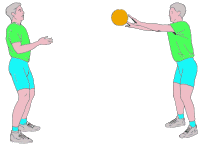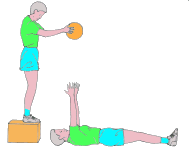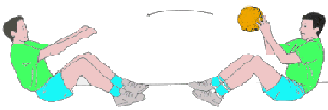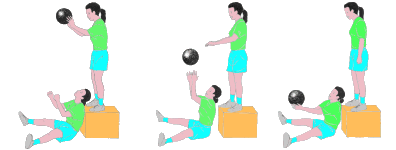| |
Arm Plyometrics
This following are a selection of plyometric
exercises designed to develop the elastic strength of the upper body.
Chest Pass

How to perform the drill
- This drill requires a partner
- Stand facing each other with your feet
shoulder width apart and your knees slightly bent
- Begin by holding the medicine ball with
both hands at chest level, elbows pointing out
- Pass the ball to your partner, pushing
it off your chest and ending with your arms straight
- Your partner catches the ball, allows
the ball to come to the chest before passing it back to you
- Try to anticipate the catch and return
the ball as quickly as you can
- Keep the catch time to the shortest time
possible
How much
- 1 to 3 sets
- Allow a full recovery between each set
- 10 to 20 repetitions/set
- Quality of Chest Passes is far more
important than quantity
Incline Push up depth
jump

How to perform the drill
- Two mats, three to four inches high,
placed shoulder width apart
- A box high enough to elevate your feet
above your shoulders when in a push-up position
- Face the floor as if you were going to
do a push-up, with your feet on the box and your hands between the mats
- Push off from the ground with your hands
and land with one hand on each mat
- Push off the mats with both hands and
catch yourself in the starting position
- Keep the catch time to the shortest time
possible
How much
- 1 to 3 sets
- Allow a full recovery between each set
- 10 to 20 repetitions/set
- Quality of Push Ups is far more
important than quantity
Power Drop

Develops the pectorals, anterior deltoids
How to perform the drill
- This drill requires a partner
- Lie supine on the ground with your arms
outstretched
- Your partner stands on the box holding
the medicine ball at arm's length
- Your partner drops the medicine ball
into your hands.
- Catch the ball with elbows bent
- Allow the ball to come towards your
chest
- Extend the arms to propel the ball back
to the partner on the box
- Keep the catch time to the shortest time
possible
How much
- 1 to 3 sets
- Allow a full recovery between each set
- 10 to 20 repetitions/set
- Quality of the vertical toss is far more
important than quantity
Incline Chest Pass

How to perform the drill
- Work with a partner and sit facing each
other
- Lean back at a 45 degree angle, keeping
your abdominals tight
- Begin by holding the medicine ball with
both hands at chest level, elbows pointing out
- Pass the ball to your partner, pushing
it off your chest and ending with your arms straight
- Your partner catches the ball, allows
the ball to come to the chest before passing it back to you
- Try to anticipate the catch and return
the ball as quickly as you can
- Keep the catch time to the shortest time
possible
How much
- 1 to 3 sets
- Allow a full recovery between each set
- 10 to 20 repetitions/set
- Quality of Chest Passes is far more
important than quantity
Vertical Toss

How to perform the drill
- This drill requires a partner
- Sit in front of the box with your back
to it, legs spread apart and straight
- The other person stands on the box
holding the medicine ball over you
- Your partner drops the medicine ball
into your hands
- Catch the ball with elbows bent and toss
it back over your head to the partner on the box
- Keep the catch time to the shortest time
possible
How much
- 1 to 3 sets
- Allow a full recovery between each set
- 10 to 20 repetitions/set
- Quality of the vertical toss is far more
important than quantity
Catch and throw
backhand
Develops the external rotators
How to perform the drill
- This drill requires a partner
- Stand with your feet shoulder width
apart, with a stable base and a good posture
- Bend your right arm to 90 degrees and
tuck your elbow into your side
- Keep your trunk facing forward
- Rotate the right arm out ready to catch
the ball
- Your partner stands to your right and
throws a small ball (1kg) to your right hand
- You catch it, then quickly take the ball
across your body rotating your right arm inwards, and the immediately
throw the ball back, powerfully rotating the right arm out.
- Do not use your trunk and keep your
right elbow into your side at all times.
- Concentrate the effort on your right
rear shoulder and external rotator muscles
- Repeat for the left arm with your
partner standing on your left side
How much
- 1 to 3 sets
- Allow a full recovery between each set
- 10 to 20 repetitions/set
- Quality of the throw is far more
important than quantity
Warm up/down
A thorough warm-up is essential prior to
plyometric training. Attention should be given to jogging, stretching
(static and ballistic), striding and general mobility especially about the
joints involved in the planned plyometric session. A warm-down should
follow each session.
Where to do it and what to wear
For bounding exercises use surfaces such as
grass or resilient surfaces. Avoid cement floors because there is no
cushioning. Choose well-cushioned shoes that are stable and can absorb
some of the inevitable impact. All athletes should undergo general
orthopedic screening before engaging in plyometric training. Particular
attention should be given to structural or postural problems that are
likely to predispose the athlete to injury.
Young athletes
Some authors suggest that moderate jumps
can be included in the athletic training of very young children (Lohman,
1989). However, great care needs to be exerted when prescribing any
training programs for pre-adolescent children. Because of the relatively
immature bone structure in pre-adolescent and adolescent children the very
great forces exerted during intensive depth jumps should be avoided
(Smith, 1975).
|
|
![]()